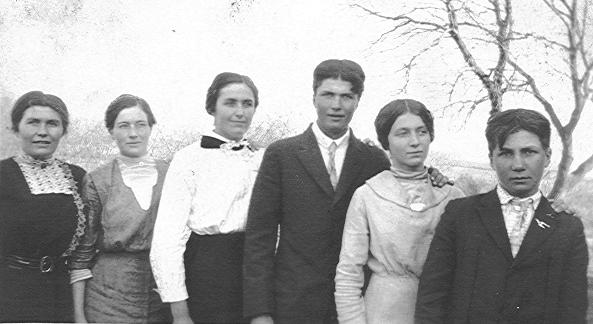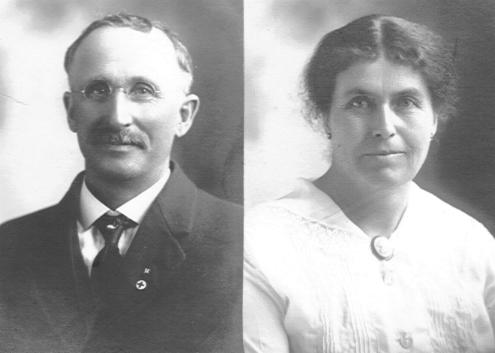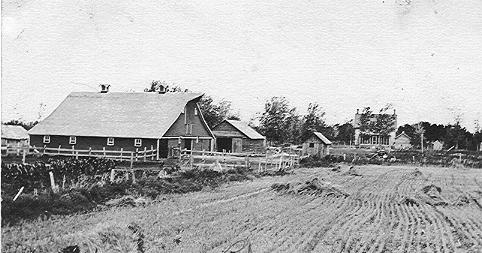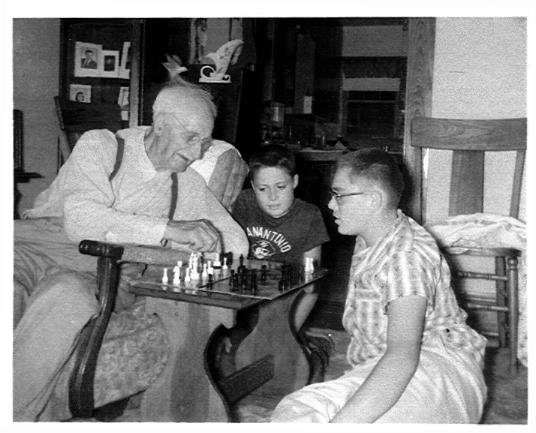This is the story of the Walter family,
as told to me in 1945 by Grandpa Walter. I typed as he talked
and much of it is direct quote and unedited. I hope you will enjoy
reading Grandpa's version of our ancestors -- Mabel Dean [daughter
of Rena Walter - this text copied and edited by Larry Dean, her
son in 2005]
Anna Katherine Ollendorf and George Walter [1800-1858] lived
in Kruspis, in the Hessian country of Germany, and later migrated
to Canada. They are buried at Neustadt, Ontario Canada. Their
children were Jacob [1831-1918], Kathrine, Fred, Elizabeth
and John.
In the year 1851, when Jacob was twenty years old, conditions
in Germany were such that it was difficult for a young man to
obtain land and a home. It was also one year that the German Army
didn't draft young recruits, so many young men were free to leave
the country. Jacob and a friend landed at Baltimore after six
weeks travel in a sailing vessel. They travelled by train to Waterloo,
Ontario Canada, where they filed for homesteads in the Province
of Ontario, town of Neustadt in Normandy Township of Gray County.
They walked to their newly acquired land, which was sixty miles
northwest of Waterloo, the entire distance was through dense forest.
When they arrived at Neustadt, friends they had known in Germany
helped them locate their property by number [Concession 14, lot
12]. They found a big hemlock tree, five feet in diameter, that
had fallen. They laid poles from it to the ground, covered the
poles with brush for temporary shelter until they built their
log cabin. Each took 200 acres, one on each side of the road.
They cleared the land of timber, using two oxen for power. [A brief description of Normanby Township
from 1861 census]
It was here that Jacob met and married Recina Denner [1841-1862]
and two children were born - Dora [1859] and August [1862]. [Recina
or Rosena also came from Germany, her parents were Eva [Hartmann]
and Johannes Denner. She was buried at Neustadt in 1862.] [August
moved to Nebraska, in 1881, married Catherina in 1888, children
Casper, John, Eli, Otto and Levina] [Dora moved to Nebraska in
1886 and married John J Harley in 1888, children Casper, Magdelena,
John and Alma].
When Jacob was alone with the two children, his sister [Kathrine]
took care of August for two years with her own little girl, Anna.
They were about the same age. Jacob had friends who told him of
a shoemaker at Waterloo who had two marriageable daughters. He
walked to Waterloo to see them. The older girl wouldn't go to
the timber to live, so he chose the younger. She was willing to
leave home as her home life wasn't happy since her father had
a 'taste for liquor'. Christina (Regina) Walter [1844-1908] daughter
of Regine [Geiger] and Gottlieb Christian Walter formerly of Stuttgart
Germany, and Jacob (no relation) were married, and walked (the
sixty miles) back to the homestead. Their children all born in
Canada were-
- Katie (married Henry Lauman)
born 1864, children - Angeline, John, Alfred, Arthur, Violet,
and Harold, all born in Canada. died 1930.
- John born 1866, (married Mary Spuhler) children
- Rena, Clara, Alvina, Alfred, Mabel and Henry, all born
in Nebraska
- Fred (married Julia Boettcher [1874-1916]) born 1868-1942,
children - Ruth, Wilfred John, Ceclia Anna, [Elmer F and Ester
C. Immigrated in 1901, living in North Dakota in 1910.]
- Anna (married George Ritz) born 1869, children - Gertrude
and Gordon [Living in Manitoba Canada 1901 and 1911 census]
- Lizzie (married Henry Gutzke) born 1871, child - Walter
- George, born 1874, died 1933
- Rena (married Pete Brown) born 1877, died 1949, children
- Marie, Walter, Leo, Henry and Gordon
- Susie (married Chris Gathje) born 1879, children - Minnie,
Henry, Marie and Clara
- Maria (married Barnhardt Luttmann)
born 1882, 11 children after moving to Minnesota, died 1941
- William, born 1883 (married widow Anna Butterfield)
- Otto, born 1887 (married Nora Reifer) children Dora, Donald,
Wayne, LeRoy, Thelma, Ruth, Vernon and Kenneth
- Alfred, born 1887, twin brother to Otto.

- Jacob and Christina Walter
Jacob was a Sunday School teacher for many years and also sang
in the church choir. He taught his own children and grand-daughters
[Rena, Clara and Alvina] to sing. Music was a very important part
of his life, and the day before he died he sang with his oldest
daughter. He was buried at Chambers NE.
When John was five years old, Jacob's sister, Elizabeth Harley,
later Becker, wanted to adopt him as she had no children. John,
although not adopted, went to live in her home and stayed there
until he was sixteen years of age. She lived near the town of
Clifford [10 miles east of Neustadt].
John received his education in a log school, one-half mile
away from home. It was heated by a box stove which burned wood
(beech and maple) cut 4 feet long and split 6 or 8 inches thick.
The seats were rough hewn benches. The instructor was from Germany
and taught in the German language the ABCs and numbers. Discipline
was by hickory stick pointer applied to back of anatomy. There
were between 70 and 90 children in one room. Slates were used
for lessons, the older children helped teach the smaller ones.
When John was 10 years old, his teacher's name was Singler. One
day John was the first one to his seat after the teacher rang
the bell. John whistled in the room - Mr. Singler called him forward,
put his head between his legs and whipped him with a leather strap
frayed at the end. He attended school about 3 years in all. However
the last 2 years were in English language. The everyday language
was German. After school days were over, John helped his uncle
on the farm, where they raised wheat, oats, barley, field peas
(raised for hog feed). They had 4 cows and 2 horses on 50 acres
of land. John took wheat to the mill to be ground. The miller
took a share for his pay. At one time the uncle received two dollars
a bushel for wheat, later the price dropped to one dollar.
When John was sixteen he went home for the winter, staying
until March when he hired out to Henry Giltner for one year for
one hundred fifty dollars. Father collected the money, John received
necessary clothes for his efforts. He returned home with the intent
to stay, as his brother Fred was hired out. After one month Fred
returned home, so John hired out to an Irishman, William Ford,
receiving fifteen dollars a month for five months. With this money
he bought a pair of plow shoes, new suspenders, and of course
a little tobacco. He gave the remaining seventy-two dollars to
his father.
John stayed home the next winter and cut cord wood with his
brother Fred, then his Uncle John Harley died. John stayed with
his aunt all the next summer and winter, receiving eighteen dollars
a month.
Brother August went to Nebraska USA in September, 1884 and
took a homestead on Holt Creek. His father visited him in the
fall of 1885 to see what the country was like, and what possibilities
it offered. In February 1886, John with his friend John Harley
went to DeWitt NE because he had friends from Ontario who had
settled there. After visiting there for six weeks they went to
Emmet by train to see brother August. At Norfolk they were served
a meal of rotten eggs for 25 cents. It was the first day of April
1886 when he got off the train at Emmet. August was working at
Zeimers Ranch at the time, so John also stayed there a couple
of weeks before they went out to the homestead.
In preparation to go to the homestead, August bought a pair
of steers and broke them in to use to pull a plow. When the time
came to leave, a very heavy snow delayed their departure ten days.
When the snow finally melted, they started to the homestead, equipped
with a wagon, two steers, a breaking plow, potatoes, flour, bacon
and a few other necessities. There distination was fourteen miles
southwest of Emmet.
When they got to the Elkhorn River it was high, the heavy show
had caused it to overflow its banks. John took off his shoes and
pants and lead the steers through the water, then put the dry
clothes on again. They followed a trail all day until they came
to Holt Creek. There they encountered high water again, no bridge.
It was August's turn to lead the steers and John stayed on the
wagon. They didn't get far when they were in quicksand. John let
the pin out of the yoke and August led the steers across. From
there, the steers pulled, John lifted first one wheel then another
and by much pushing, pulling, lifting, and tugging, they finally
got the wagon through the river.
They were still about two miles from the shanty on the homestead.
The trail followed along the creek. Suddenly the wheels dropped
into mire. It was getting dark, and the boys could just see the
shanty, so they carried the flour and what else they could, and
leading the steers, they arrived 'home'.
At that time the country was vast prairie with no trees at
all, and nothing to tie the steers to, so they tied the rope to
a stick, put the stick inside the door, thereby holding the animals
for the night. August had built the frame shanty, 12x14 feet,
the year before, and it was equipped with a Topsy stove, homemade
bedstead, comforters, - 'We didn't need much'.
They got the wagon out the next day, then August went to his
Norwegian neighbors, who lived one-half mile south, to have her
make biscuits for them. About noon he went to get them.. they
were the size and density of baseballs. John stayed with his brother
three weeks. During that time they broke four acres of land, walked
to the post office three times, which was at Emmet, fourteen miles
away.
Since August was pretty well 'settled' by now, John decided
he'd find employment elsewhere. He had heard the [Chicago
and] Northwestern Railroad was hiring men, so he went to Chadron
NE. He had very little money, the first night he walked around
the railyard looking for a car to sleep in. He met the watchman
who carried a six-shooter. "What are you doing here?"
John told him he was looking for a place to sleep. The watchman
opened the door of a boxcar with the warning not to tell. His
feet were wet and he had only a cotton blanket for warmth. He
removed his shoes and walked back and forth from 3 am to daylight
to keep warm. He had to wait ten days before getting the railroad
job. He did odd jobs around the countryside for board and room.
He applied for a job with a plasterer, but no luck however he
was directed to a place in the country where he helped plant trees
for his board. He finally hocked his ten-dollar watch for 3 dollars
to buy baloney and bread, sleeping in a livery barn at night.
His railroad job was to help lay ties from Buffalo Gap to Rapid
City, Dakota Territory. The working conditions were deplorable.
The work was hard and no decent water to drink. Two weeks of this
was enough for John. He and a friend, William Duwell, found employment
with a grading contractor who had the contract to build the Scribner-Oakdale
line. They helped the contractor load his equipment then road
on the train with it to Norfolk NE. After arriving at Norfolk
they were informed work would not begin for another ten days,
so John and William decided to hire out to farmers in the southern
part of the state.
They left Norfolk in the evening, walking south to Madison.
They could see a bad storm coming up and also a light in the distance.
Heading directly to the light they walked in water 'up to their
necks', finally finding shelter from the storm at a farmhouse.
The rain poured down, the roof of the house leaked and it blew
in around the windows. The lady of the house gave each a blanket
and they slept on the floor. The next morning the lady made them
a delicious breakfast of pancakes, bacon and coffee before they
went on their way.
John hired out for a month to a farmer, Frank Froericks, at
Madison NE. When the month was up, the farmer convinced him to
stay longer, for $15 a month. He stayed eleven months in all.
During this time he filed his intent to become an American citizen.
John returned to Holt county and filed for a homestead in the
fall of 1887. He worked on the Bleben ranch south of Emmet for
about two years.
During this time he visited the Harley
family, southwest of Chambers NE, which had been neighbors
of his family in Canada. One time when John visited the Harleys
in 1887, Katie's friend Mary Spuhler was also there, that was
the first time he saw the future Mrs John Walter. The Harleys
were neighbors of carpenter Peter Spuhler [1842-1920] and Sophia
[Kniep] Spuhler [1843-1900 died at Hobart OK] whose children were-
- Fred [Friedrich] born 1864 in Germany
- Lena [Magdelena][married William Barrett and Milton Sheldon]
born 1867 in Germany
- Mary [Maria] [married John Walter] born 1869 - 1943
in Germany
- Louise [Louisa] [married Adam Roth] born 1871 in Germany
- Nick born 1873 in Appleton WI
- Louis Peter, 1875 in Pittsburg PA
- Emma Sophia [married Greenland] born 1877 in Cherokee IA
- Henry born 1878 in Cherokee IA
- Bertha [married Greenland] born 1880 in Wisner NE
- Anna Augusta [married Leonard -] born 1881 in Chambers NE
- Frank [Franz] Jacob born 1883 in Chambers NE
- Otto Wihelm, born 1886 in Chamber NE
Mary was the daughter of Peter Spuhler who was born in Alsace-Lorraine,
close to Metz-on-the-Rhine, which is on the west side of the river.
Her mother was Sophia Katherine Deerstein Knipe who was born nearby,
but on the east side of the Rhine. Peter was a carpenter by trade,
and a band leader playing cornet and accomplished accordianist.
The older four children were all born in Germany. Sophia was dissatisfied
with their environment and wanted to move. She didn't approve
of Peter playing in the dance band and the drinking, which was
a part of that.
The Spuhlers arrived in America in 1873 and located in Appleton
WI for a year. They moved to Cherokee Iowa for three years, then
to Wisner NE where they lived until 1883. Mary was hired out to
herd cattle and knitted while out in the fields. Sometimes the
cattle would stray and she would go after them barefooted over
the sandburrs. At times she would milk as many as 18 cows. One
time she was so tired being late at night, that when she crawled
under the fence she rested a moment and fell asleep. When she
awoke the hogs were slurping the last of the milk. She was severly
scolded.
In 1883 the family took a homestead five miles southeast of
Chambers NE. For fuel, Mary and Lena would cut down willows that
grew along the creek and tied them in bundles. Another fuel in
those days was hay. Many and Lena carried butter and eggs to Chambers
where there was a store, post office and blacksmith shop in the
same building. They would get a nickle a pound for butter or a
dozen eggs, which were then traded for groceries. Father was away
much of the time doing carpentry work.
Mary hired out to McClures who lived between Chambers and Ewing,
and later to Albert Miller in 1887, who lived two miles east of
Chambers. Here she learned to make pressed cheese. Her next employment
was by Cargill Graham, 2 miles west and 1.5 miles north of Chambers.
She was here during the blizzard of 1888. During the blizzard,
Mary was alone with Susi Graham who was a midget and the sister
of Cargill. Mary had to make the hazardous trips to the barn to
get hay for the hayburner, and she also burned meat cracklings
after the other fuel ran out.
Her next employment was at Winns, southeast of Chambers, then
she worked at the Bleban Ranch during haying. John was working
on the Bleban Ranch during the blizzard of 1888, where he hauled
hay for 400 head of cattle. He was out in the blizzard all day
trying to feed the cattle in the barns, carrying corn to them
instead of hay. He went to the house at noon for dinner, then
returned to the sheds. After seeing he couldn't do anymore, he
started back to the house at about 4 pm. He couldn't see a thing,
it was as though he were blind-folded. He had to feel his way
on the snow packed on the path, but he got off. He couldn't find
a way back, wo he guessed the direction of the house, and finally
bumped into the wash boiler which he knew sat 70 yards east of
the house. The wind was very strong. When he had gone 75 steps
he stopped, suddenly the wind switched direction and for a flash
he could see he was about six feet from the kitchen door. Next
day the temperature measured minus 35 degrees [and windchill].
In order to prove up, it was necessary to live on the homestead,
which was thirteen miles southwest of Emmet. After seeing Mary
Spuhler, John knew it would be much too lonely living there alone.
They were married September 9, 1888 at the Spuhler home. Their
attendants were August and Katie Walter [who were married earlier
that year]. Willie Caulkins officiated as Justice of the Peace.
Their children -
- Rena [Regina S.], born 1889-1973
- Clara D., born 1890 [married William Sprandel]
- Alvina K., born 1892-1980 [married Chris Haussler]
- Alfred A., born 1898-1979 [married Ruth L. ]
- Mabel C., born 1900-1992 [married Charles Van Robertson,
sons C. Elwyn and Delbert I.]
- Henry Christian, born 1902-1985 [married Gertrude Ann Wendland
]

Rena, Clara, Alvina, Alfred, Mabel and Henry, c 1915
John and Mary set up housekeeping in the shanty John had bought
for $25 off the adjoining homestead. He sodded up the shanty and
dug out an addition of sod. He continued to work for Blebans that
winter, while Mary stayed on the homestead 3 miles away. They
lived on the homestead five years, proving up in the spring of
1893. He received his deed to the land and citizenship papers
at the same time. The three oldest daughters were born on the
homestead.

John Walter and Mary Spuhler
The Spuhler family had moved to Oklahoma in 1892 when the Cheyenne-Arapahoe
part of the Oklahoma Indian Territory was opening up. They thought
the country there was much better than Holt County and encouraged
John to sell out and go down there, which he did. They moved by
immigrant car on the railway.
John expected to take a homestead there, but when he went to
the land office he found he wasn't eligible as he had used his
homestead rights in Nebraska. That was the first dissappointment.
John and his father-in-law went together and leased one-quarter
section of Indian land. It was full of prairie dogs and rattlesnakes.
John built on the north eighty and Spuhler built on the south
eighty. After the year was up they decided they didn't want anymore
of Indian land.
The next year he rented land already broke up from a neighbor.
"Put twelve acres to corn, the prairie dogs ate most of it
as it came up, hot winds in July burned the rest". The second
year he put in fifty acres to wheat. He harvested 18 bushels to
the acre and received 75 cents a bushel. The third year he planted
107 acres to wheat. It was a dry year and he harvested 40 bushels
[total]. He then sowed fall wheat, 160 acres, and again had drought.
He harvested only 240 bushels and recieved 22 cents a bushel.
That was enough of Oklahoma.
They started back to Nebraska in a covered wagon, coming the
600 miles in three weeks. They stopped at Deloit NE where Louise
[Spuhler] and Adam Roth were working a ranch. John stayed on at
the ranch to work, and Mary and the girls lived in the house on
the Roth farm south of Clearwater, which was vacant at the time.
In the spring John rented the farm west of Chambers. The house
consisted of a shack and sod kitchen, full of rats. He rented
the place for two years and then bought it.

John Walter farm west of Chambers as it appeared in later
years
Of course the story does not really end there. John's parents,
Jacob and Christina, and most of his brothers and sisters moved
from Canada to Nebraska where they prospered. In the 1900 census
at Chambers, besides the children, living in the household were
father and mother Jacob and Christine R. Walter, and brother George
Walter all having migrated from Canada. Walter
family found in the 1930 census.

- Great Grandpa John Walter had not only an interesting life
but a long one. As a child growing up I had the pleasure of visiting
him at his home in Chambers NE where he was cared for by Rena , his oldest daughter and my grandmother.
That's me in the center - Larry Dean c1958
From 1940 Who's Who in Holt County NE.
- WALTERS, JOHN: Retired; b Neustadt, Ontario Canada,
Sept 30, 1866; s of Jacob Walters-Christina ___; ed Ontario Canada;
m Mary Spuhler Sept 9, 1888 Chambers; s Alfred, Henry; d Rena
(Mrs Ernest Feyerherm), Clara (Mrs William Sprandel), Alvina
(Mrs Chris Haussler), Mabel (Mrs C V Robertson); 1886-88 emp
on farms & ranches, Holt Co; 1887-96 homesteaded in Holt
Co, oprd farm lands in Kingfisher Co, Okla; 1896-1928 oprd ranch
& farm lands in Holt Co; owner & mgr 500 A; past mbr
bd of edn; village bd of trustees, past chmn; road overseer,
Chambers twp 8 years; Luth Ch; Rep; hobbies, woodwork, travel;
res Chambers.
webmaster




